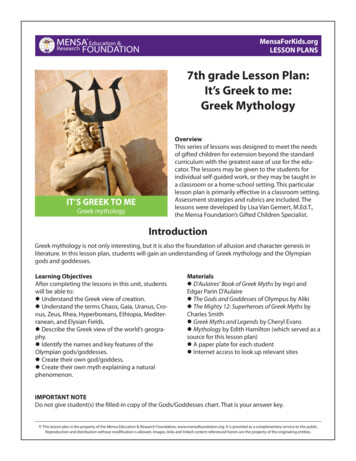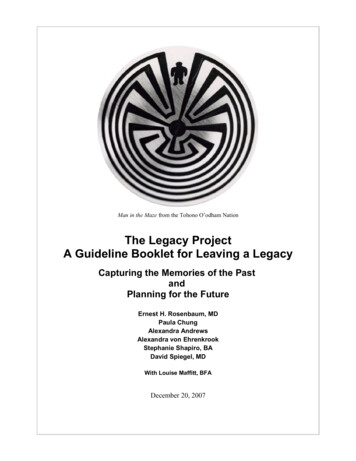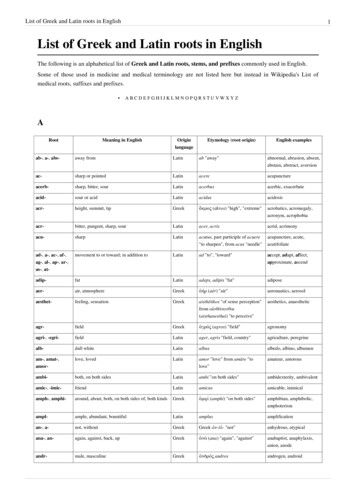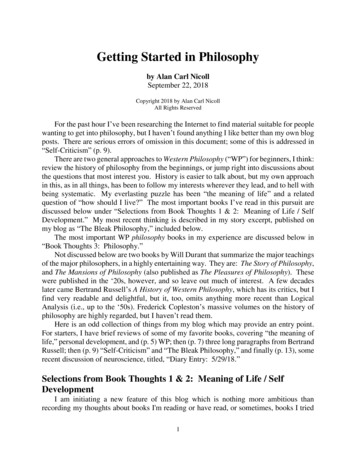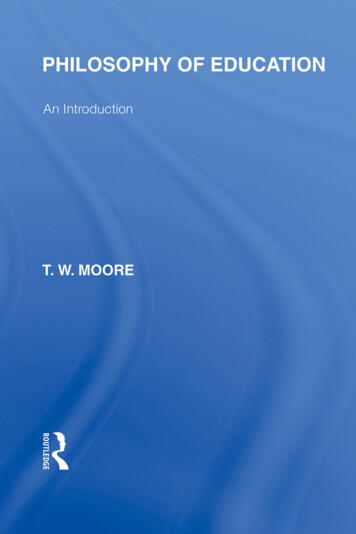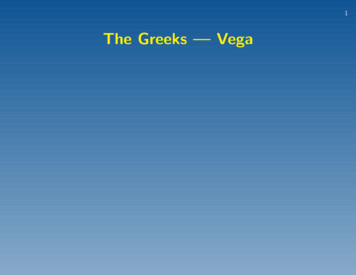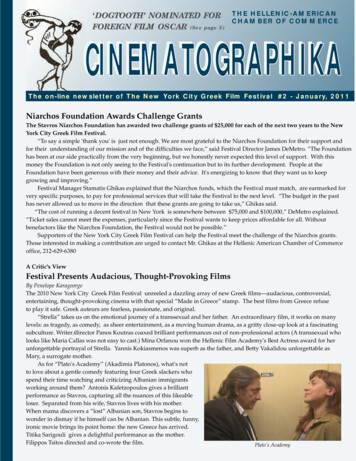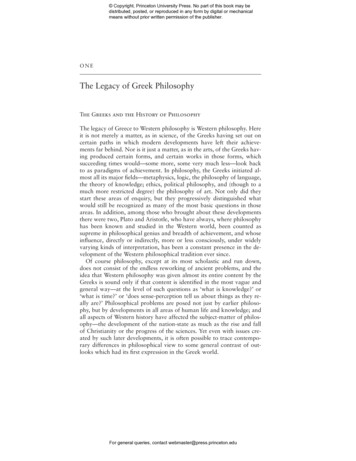
Transcription
Copyright, Princeton University Press. No part of this book may bedistributed, posted, or reproduced in any form by digital or mechanicalmeans without prior written permission of the publisher.ONEThe Legacy of Greek PhilosophyThe Greeks and the History of PhilosophyThe legacy of Greece to Western philosophy is Western philosophy. Hereit is not merely a matter, as in science, of the Greeks having set out oncertain paths in which modern developments have left their achieve ments far behind. Nor is it just a matter, as in the arts, of the Greeks hav ing produced certain forms, and certain works in those forms, whichsucceeding times would—some more, some very much less—look backto as paradigms of achievement. In philosophy, the Greeks initiated al most all its major fields—metaphysics, logic, the philosophy of language,the theory of knowledge; ethics, political philosophy, and (though to amuch more restricted degree) the philosophy of art. Not only did theystart these areas of enquiry, but they progressively distinguished whatwould still be recognized as many of the most basic questions in thoseareas. In addition, among those who brought about these developmentsthere were two, Plato and Aristotle, who have always, where philosophyhas been known and studied in the Western world, been counted assupreme in philosophical genius and breadth of achievement, and whoseinfluence, directly or indirectly, more or less consciously, under widelyvarying kinds of interpretation, has been a constant presence in the de velopment of the Western philosophical tradition ever since.Of course philosophy, except at its most scholastic and run down,does not consist of the endless reworking of ancient problems, and theidea that Western philosophy was given almost its entire content by theGreeks is sound only if that content is identified in the most vague andgeneral way—at the level of such questions as ‘what is knowledge?’ or‘what is time?’ or ‘does sense-perception tell us about things as they re ally are?’ Philosophical problems are posed not just by earlier philoso phy, but by developments in all areas of human life and knowledge; andall aspects of Western history have affected the subject-matter of philosophy—the development of the nation-state as much as the rise and fallof Christianity or the progress of the sciences. Yet even with issues cre ated by such later developments, it is often possible to trace contempo rary differences in philosophical view to some general contrast of out looks which had its first expression in the Greek world.For general queries, contact webmaster@press.princeton.edu
Copyright, Princeton University Press. No part of this book may bedistributed, posted, or reproduced in any form by digital or mechanicalmeans without prior written permission of the publisher.4 OneGranted the size of the Greek achievement in philosophy, and thedepth of its influence, it would be quite impossible to attempt anythingexcept a drastically selective account of either. Some very important andinfluential aspects of Greek philosophy I shall leave out entirely: these in clude political philosophy (which is the concern of another chapter), andalso Greek contributions to the science of logic, which were very impor tant but demand separate, and moderately technical, treatment.1 More over, in the matter of influences, I shall not attempt to say anythingabout what is certainly the most evident and concentratedly importantinfluence of Greek philosophy on subsequent thought, the influence ofAristotle on the thought of the Middle Ages. Aristotle, who was forThomas Aquinas ‘The Philosopher’, for Dante il maestro di color chesanno, ‘the master of those who know’, did much to form, through hisvarious and diverse interpreters, the philosophical, scientific, and cosmo logical outlook of an entire culture, and the subject of Aristotelianismwould inevitably be too much for any essay which wanted to discussanything else as well. Aristotle’s representation in what follows has suf fered from his own importance.After saying something in general about the Greeks and the history ofphilosophy, and about the special positions of Plato and Aristotle, I shalltry to convey some idea of the variety of Greek philosophical interests;but, more particularly, I shall pursue two or three subjects in greater de tail than any attempt at a general survey would have allowed, in the be lief that no catalogue of persons and doctrines is of much interest in phi losophy, and that a feel for what certain thinkers were about can beconveyed only through some enactment of the type of reasons and argu ments that weighed with them: of not just what, but how, they thought.In this spirit, if still very sketchily, I shall take up some arguments ofGreek philosophers about two groups of questions—on the one hand,about being, appearance, and reality, on the other about knowledge andscepticism. In both, the depth of the Greek achievement is matched bythe persistence of similar questions in later philosophy. In another mat ter, ethical enquiry, I shall lay the emphasis rather more on the contrastsbetween Greek thought and most modern outlooks, contrasts whichseem to me very important to an understanding of our own outlooksand of how problematical they are.I have said that the Greeks initiated most fields of enquiry in philoso phy, and many of its major questions. It may be, by contrast, that thereare just two important kinds of speculation in the later history of philos ophy which are so radically different in spirit from anything in Greek1 For an accessible and informative treatment, see William and Martha Kneale, The De velopment of Logic (Oxford, 1962), chs. i–iii.For general queries, contact webmaster@press.princeton.edu
Copyright, Princeton University Press. No part of this book may bedistributed, posted, or reproduced in any form by digital or mechanicalmeans without prior written permission of the publisher.The Legacy of Greek Philosophy 5thought as to escape from this generalization. Greek philosophy wasdeeply concerned, and particularly at its beginnings, with issues involvedin the contrast between monism and pluralism. It is not always easy tocapture what was at issue in these discussions: in some of the earlierGreek disputes, the question seems to be whether there is in reality onlyone thing or more than one thing, but—as we shall see later—it is noteasy to make clear what exactly was believed by someone who believedthat there was, literally, only one thing. In later philosophy, and alreadyin some Greek philosophy, questions of monism and pluralism are ques tions rather of whether the world contains one or more than one funda mental or irreducible kind of thing. One sort of monism in this sensewhich has been known both to the ancient and to the modern world ismaterialism, the view that everything that exists is material, and thatother things, in particular mental experiences, are in some sense re ducible to this material basis. Besides dualism, the outlook that acceptsthat there are both matter and mind, not reducible to one another, phi losophy since the Renaissance has also found room for another kind ofmonism, idealism, the monism of mind, which holds that nothing ulti mately exists except minds and their experiences. It is this kind of view,with its numerous variations, descendants, and modifications, which wedo not find in the ancient world. Largely speculative though Greek phi losophy could be, and interested as it was in many of the same kinds ofissues as those which generated idealism, it did not form that particularset of ideas, so important in much modern philosophy, according towhich the entire world consists of the contents of mind: as opposed, ofcourse, to the idea of a material world formed and governed by mind, atheistic conception which the Greeks most certainly had.The other principal element in modern philosophy which is indepen dent of the Greeks is something that first established itself at the begin ning of the nineteenth century—that type of philosophical thought (ofwhich Marxism is now the leading example) which places fundamentalemphasis on historical categories and on explanation in terms of the his torical process. The Greeks had, or rather, gradually developed, a sense ofhistorical time and the place of one’s own period in it; and their thoughtalso made use of various structures, more mythological than genuinelytied to any historical time, of the successive ages of mankind, which stan dardly pictured man as in a state of decline from a golden age (though anopposing view, in terms of progress, is also to be found). Some of themore radical thinkers, moreover, regarded standards of conduct and thevalue of political arrangements as relative to particular societies, and thatconception had an application to societies distant in time. But the Greeksdid not evolve any theoretical conception of men’s categories of thoughtbeing conditioned by the material or social circumstances of their time,For general queries, contact webmaster@press.princeton.edu
Copyright, Princeton University Press. No part of this book may bedistributed, posted, or reproduced in any form by digital or mechanicalmeans without prior written permission of the publisher.6 Onenor did they look for systematic explanations of them in terms of his tory. This type of historical consciousness is indeed not present in allphilosophical thought of the present day, but its absence from Greekphilosophy is certainly one thing that marks off that philosophy frommuch modern thought.It may be that these two, idealism and the historical consciousness, arethe only two really substantial respects in which later philosophy is quiteremoved from Greek philosophy, as opposed to its pursuing what arerecognizably the same types of preoccupation as Greek philosophy pur sued, but pursuing them, of course, in the context of a vastly changed,extended, and enriched subject-matter compared with that available tothe Greeks.This is not to say that the Greeks possessed our concept of ‘philoso phy’: or, rather, that they possessed any one of the various concepts ofphilosophy which are used in different philosophical circles in the mod ern world. Classical Greek applies the word philosophia to a wide rangeof enquiries; wider certainly than the range of enquiries called ‘philoso phy’ now, which are distinguished from scientific, mathematical, and his torical enquiries. But we should bear in mind that it is not only Greekpractice that differs from modern practice in this way: for centuries‘philosophy’ covered a wide range of enquiries, including those into na ture, as is witnessed by the old use of the phrase ‘natural philosophy’ tomean natural science—The Mathematical Principles of Natural Philoso phy is what Newton, at the end of the seventeenth century, called hisgreat work on the foundations of mechanics. It does not follow, how ever, that these ages did not have some distinction between scientificand what would now be called philosophical enquiries—enquiries which,however they are precisely to be delimited, are concerned with the gen eral presuppositions of knowledge, action, and values, and proceed byway of reflection on our concepts and ideas, not by way of observationand experiment. Earlier ages often did make, in one way or another, dis tinctions between such enquiries and others—it is merely that untilcomparatively recently the word ‘philosophy’ was not reserved to mark ing them.It is important to bear this point in mind when dealing with the phi losophy of the past, in particular ancient philosophy. It defines, so tospeak, two grades of anachronism. The more superficial and fairly harm less grade of anachronism is displayed when we use some contemporaryterm to identify a class of enquiries which the past writers did themselvesseparate from other enquiries, though not by quite the same criteria oron the same principles as are suggested by the modern term. An exampleof this is offered by the branch of philosophy now called ‘metaphysics’.This covers a range of very basic philosophical issues, including reality,For general queries, contact webmaster@press.princeton.edu
Copyright, Princeton University Press. No part of this book may bedistributed, posted, or reproduced in any form by digital or mechanicalmeans without prior written permission of the publisher.The Legacy of Greek Philosophy 7existence, what it is for things to have qualities, and (in the more ab stract and less religious aspects of the matter) God. There is a set of writ ings devoted to such subjects in the canon of Aristotle’s works, and it iscalled the Metaphysics; and it is indeed from that title that the subjectgot its name. But the work was probably so called only from its positionin the edition of Aristotle’s works prepared by Andronicus of Rhodes inthe first century b.c.—these treatises were ta meta ta phusika, the booksthat came ‘after the books on nature’. Aristotle’s own name for most ofthese metaphysical enquiries was ‘first philosophy’. Nor is it just thename that was different, but so were the principles of classification,both in the rationale given of them and hence in what is included andexcluded. Thus Aristotle has an account of his enquiries into ‘being ingeneral’ which relates the themes of ‘first philosophy’ in a distinctivelyAristotelian way to the rest of knowledge (roughly, he supposed that itwas distinguished by having a subject-matter which was much moregeneral than that of other enquiries); and it excludes some enquirieswhich might now be included in metaphysics, such as a priori reflec tions on the nature of space and time. These latter Aristotle takes up inthe books now called the Physics, which were included among thebooks ‘about nature’; the name Physics itself being misleading, sincewhat their contents mostly resemble is parts of metaphysics, and alsowhat we would now call the philosophy of science, rather than what wenow call physics.These various differences do not stop us identifying Aristotle’s en quiries as belonging to various branches of philosophy as we now under stand them: this level of anachronism can, with scholarship and a senseof what is philosophically relevant, be handled—as it must be, if we aregoing to be able to reconstitute from our present point of view some thing which it would not be too arbitrary to call the history of philoso phy. But there is a second and deeper level of anachronism which wetouch when we deal with writings to which modern conceptions of whatis and what is not philosophy scarcely apply at all. With those writerswho did not themselves possess some such distinctions, to insist onclaiming them for the history of philosophy as opposed to, say, the his tory of science, constitutes an unhelpful and distorting form of anachro nism. So it is with the earliest of Greek ‘philosophers’, the earlier Preso cratics (a label which as a matter of fact is used not only for thinkersearlier than Socrates, but for some late-fifth-century contemporaries ofhis as well).With regard to the earliest of Greek speculative thinkers, Thales, Anax imander, and Anaximenes, who lived in Miletus on the Greek seaboard ofAsia Minor in the first seventy years of the sixth century b.c., it is impos sible to give in any straightforward modern terms a classification of theFor general queries, contact webmaster@press.princeton.edu
Copyright, Princeton University Press. No part of this book may bedistributed, posted, or reproduced in any form by digital or mechanicalmeans without prior written permission of the publisher.8 Onekinds of question they were asking. This is not just because virtuallynothing remains of their work (Thales, the oldest, in any case wrotenothing) and we have to rely on disputable reports; even if we had alltheir writings we could not assign them, in modern terms, to philosophyor to science. They are usually represented as asking questions such as‘what is the world made of?’, but it is one achievement of intellectualprogress that that question now has no determinate meaning; if a childasks it, we do not give him one or many answers to it, but rather leadhim to the point where he sees why it should be replaced with a range ofdifferent questions. Of course, there is a sense in which modern particletheory is a descendant of enquiries started by the Milesians, but that de scent has so modified the questions that it would be wrong to say thatthere is one unambiguous question to which we give the answer ‘elec trons, protons, etc.’ and Thales (perhaps) gave the answer ‘water’.We can say something—and we shall touch on this later—about thefeatures of these speculations which make them more like rational en quiries than were the religious and mythological cosmologies of the East,which may have influenced them. And this is in fact a more importantand interesting question than any about their classification as ‘philoso phy’, something which in the case of these earliest thinkers is largely anempty issue.Classical Philosophy and the Philosophical ClassicThe involvement of Greek philosophy in the Western philosophical tra dition is not measured merely by the fact that ancient philosophy origi nated so many fields of enquiry which continue to the present day. Itemerges also in the fact that in each age philosophers have looked back toancient philosophy—overwhelmingly, of course, to Plato and Aristotle—in order to give authority to their own work, or to contrast it, or by rein terpretation of the classical philosophers to come to understand them,and themselves, in different ways. The Greek philosophers have been notjust the fathers, but the companions, of Western philosophy. Differentmotives for this concern have predominated in different ages: the aim oflegitimating one’s own opinions was more prominent in the Middle Agesand the Renaissance (which, contrary to popular belief, did not so muchlose the need for intellectual authority, as choose different authorities),while the aim of historical understanding and self-understanding is moreimportant in the present day. But from whatever motive, these relationsto the Greek past are a particularly important expression of that involve ment in its own history which is characteristic of philosophy and not ofthe sciences.For general queries, contact webmaster@press.princeton.edu
Copyright, Princeton University Press. No part of this book may bedistributed, posted, or reproduced in any form by digital or mechanicalmeans without prior written permission of the publisher.The Legacy of Greek Philosophy 9It has been a characteristic also of literature, though the nature of theinvolvement in that case is very different. It has been suggested2 that ourconceptions of Western literature have room for the notions both of a‘relative classic’—a work which endures and has influence and stands atleast for a period of time as an exemplar—and of the ‘absolute classic’,above all the Aeneid, which defines for ever the high ‘classical’ style.Adapting these notions to philosophy, we might say that the classicalphilosophers Plato and Aristotle are classics in the sense that it has beenimpossible, at least up to now, for philosophy not to want to make someliving sense of these writers and relate its positions to theirs, if only byshowing why they have to be rejected: this is a status which they haveshared, in the last 200 years, only with Kant. But they might be said alsoto define a classical style of philosophy—meaning by that a philosophi cal, not a literary, style. They are both associated with a grand, imperial,synoptic style of philosophy; though beyond that very general descrip tion, they have been acknowledged from ancient times to define two dif ferent styles, Plato being associated with speculative ambitions for phi losophy, seeking to establish that another world of intellectual objects,the Forms, accessible to reason and not to the senses, was ultimatelyreal, while Aristotle renounced these extravagant other-worldly hypothe ses in favour of a more down-to-earth, classificatory, and analyticalspirit, more respectful of the ordinary opinions of men—but defining agrand style for all that, since the systematic impulse was directed to pro ducing one unified, ordered, and hierarchical world-picture.Oppositions of the Platonic and the Aristotelian spirits have been acommonplace. In our own century, Yeats wrote, in Among School Chil dren:Plato thought nature but a spume that playsUpon a ghostly paradigm of things;Solider Aristotle played the tawsUpon the bottom of a king of kings . . .Most famously, the received contrast is expressed in Raphael’s fresco inthe Vatican called The School of Athens, which displays the two centralfigures of Plato and Aristotle, the one with his hand turned towardsheaven, the other downwards towards earth. In this connection onemust remember the mystical elements which were associated with Pla tonic thought: not altogether falsely, so far as some of Plato’s own writ ings are concerned, but very heavily selected for and modified by theNeo-Platonist tradition. It is connected with this image of Plato that fora period in the early Middle Ages only the Timaeus (in Latin translation)2See Frank Kermode, The Classic (London, 1975).For general queries, contact webmaster@press.princeton.edu
Copyright, Princeton University Press. No part of this book may bedistributed, posted, or reproduced in any form by digital or mechanicalmeans without prior written permission of the publisher.10 Onewas known, an untypical dialogue in which a theistic cosmogony isadvanced.Looked at more than superficially, the famed contrast is a very com plex and ambiguous matter. The spirit of Plato has sometimes been asso ciated with the religious impulse as such; but equally, and in fact moreimportantly, where the framework of thought is already religious, an ex panded Aristotelianism has represented an ordered and stable under standing of the world in relation to God, while Platonism has been takento represent variously humanism, magic, or individual rational specula tion.The old picture by which the Middle Ages built on Aristotle, but theRenaissance got its inspiration from Plato, has been much qualified bymodern scholarship, but it retains enough truth,3 and more than one im portant Renaissance thinker agreed with the words of Petrarch, thatPlato ‘in that group came closest to the goal that may be reached bythose whom heaven favours’. Much of this Platonic influence flowedinto humane studies and the betterment of the soul, rather than thestudy of nature; and where the study of nature is pursued in the Renais sance, outside the continuing traditions of Aristotelian science, there isdeep uncertainty and disagreement about what kinds of procedure orlore may prove effective in uncoding the messages hidden in phenomena.It is rather later, and with a vision much closer to modern conceptions ofmathematical physics, that Galileo expressed what is still a Platonic in fluence in saying:(Natural) philosophy is written in that vast book which stands for ever open before our eyes, I mean the universe; but it cannot be readuntil we have learnt the language and become familiar with the char acters in which it is written. It is written in mathematical language,and the letters are triangles, circles, and other geometrical figures,without which means it is humanly impossible to understand a singleword. (Il Saggiatore, Question 6)From this point on, the business of decipherment could be more readilydetached from notions of an arcane mystery, which were present in theRenaissance, as they were originally in the early Pythagorean sects whichinfluenced Plato; it could become the public task of critical scientific dis cussion.Thus in one context Platonism may represent a mystical or cabbalisticinterest, against which Aristotelianism stands for a cautious, observa 3 See P. O. Kristeller, ‘Byzantine and Western Platonism in the Fifteenth Century’, inRenaissance Concepts of Man (New York, 1972), and references. The quotation fromPetrarch (Trionfo della Fama, 3. 4–6) is taken from this article.For general queries, contact webmaster@press.princeton.edu
Copyright, Princeton University Press. No part of this book may bedistributed, posted, or reproduced in any form by digital or mechanicalmeans without prior written permission of the publisher.The Legacy of Greek Philosophy 11tional approach, concerned to stick to the phenomena; in another, whilea Platonic influence encourages rational enquiry into nature, Aristotelian ism can be seen (as it was by Descartes, despite his occasional dissimula tions) as an obscurantist attachment to mysterious essences and muddledvitalistic analogies. An opposition of the Platonic and Aristotelian spiritsis indeed something real, which can be traced through very complexpaths in the history of Western thought; but it defines not so much anyone contrast, as rather a structure within which a large number of con trasts have in the course of that history found their place.Various as these contrasts have been, what can be said is that the ma jority of them have been associated with interpretations of these philoso phers’ views and, in many cases, with what have been believed to betheir systems. Under these various interpretations, they have still beenseen as authors of large world-views, as classical system-builders. Mod ern scholarship, encouraged by a philosophical scepticism about systembuilding, has tended to reduce the extent to which these philosophers areseen as expressing systems. In both cases, their works are now moreclearly seen as the product of development over time, with correspon ding changes of outlook; while discussions which in the past were takento be fundamentally expository can be seen to be more provisional, ex ploratory, and question-raising than was supposed. If this point of viewis accepted, does it mean that the importance of Plato and Aristotle, asmore than a purely historical recognition, will for the first time be radi cally reduced? Perhaps not: the power and depth of their particular argu ments may come to be what command admiration and interest ratherthan the breadth and ambition of their systems. Yet it would be superfi cial to rest too easily on this idea. The interest that these two philoso phers have always commanded in the past has been generated not merelyby admiration for their undoubted acuity, insight, and imagination, but,very often, by a belief that they had vast and unitary systematic ambi tions, of a kind which we now have rather less reason to ascribe to them.Apart from these issues of how the work of Plato and of Aristotle is tobe interpreted, there are in any case other, more general influences likelyto affect their traditional standing. Those features of twentieth-centuryculture which have weakened the hold of the classic, and of the idea thatpast works can have any authority over the taste of the present, applyin some degree to philosophy. Past geniuses of philosophy, as of thearts, look different under the influence of our idea, deeply felt and largelycorrect, that twentieth-century experience is drastically unprecedented.Again, in more technical areas of contemporary philosophy, there havebeen developments from which some of it has attained the research pat tern of a science, and in any such area its interest in any of its past, letalone its Greek past, becomes necessarily more external and ultimatelyFor general queries, contact webmaster@press.princeton.edu
Copyright, Princeton University Press. No part of this book may bedistributed, posted, or reproduced in any form by digital or mechanicalmeans without prior written permission of the publisher.12 Oneanecdotal. For both these reasons, the role of an absolute classic in phi losophy, the role which Plato and Aristotle have peculiarly played, is onethat quite conceivably may lose its importance. The question here is notwhether philosophy might cease to be of interest—there is more thanone dispiriting kind of reason why that might prove to be so—butwhether, granted philosophy retains its interest, Plato and Aristotlemight not do so, and might become finally historical objects, monumen tal paradigms of ancient styles. It is not impossible, but if it were to hap pen at all, there is one reason why it is less likely to happen to Plato thanto his great companion: the fact that Plato’s work includes as a vivid andindependent presence the ambiguous figure of Socrates, whose aspect asironical critic of organized philosophy can be turned also against the Pla tonic philosophies, which at other points he is presented as expounding.What We HaveThe pre-eminent status of Plato and Aristotle is both the cause and theeffect of their work being quite exceptionally well preserved: though inthe case of both, and particularly of Aristotle, there was some luck in volved. Of Plato’s works, we have everything that he is known to havepublished. Of Aristotle, we do not have his dialogues (for which he wasmost admired in antiquity), but we do have a large body of treatiseswhich contain material prepared by him or in some cases by close associ ates or students.Work later than Aristotle will not in general be touched on here exceptfor some discussion of ancient scepticism; but we should not forget thelarge influence exercised on Western thought by the later schools, partic ularly the Stoics and Epicureans, quite apart from those influences onChristianity which are discussed in another chapter. The Presocraticswill be of closer concern to us. They are known to us through fragmentsof their writings, and in many respects the situation is as described in thechapter on Greek science, that we have to rely on summaries and ac counts by later writers, who may be remote in time, or stupid, or—as inthe case of Aristotle, who was neither—have their own axe to grind.There does remain one very considerable and nearly continu
Classical Greek applies the word philosophia to a wide range . ‘philosophy’ covered a wide range of enquiries, including those into na . the books . : The School of Athens. Renaissance Concepts of Man . Philosophy . On

